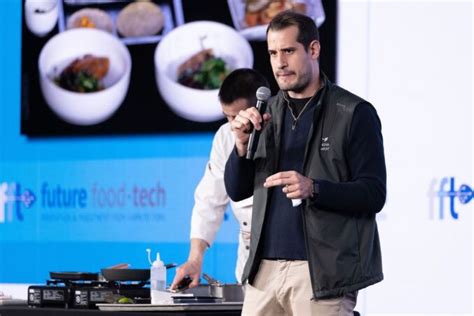As the world grapples with the challenges of feeding a growing population sustainably, the city of San Francisco has emerged as a hub for food tech innovation. With its vibrant startup ecosystem, proximity to top-tier universities, and thriving agricultural industry, San Francisco is poised to play a significant role in shaping the future of food. In this article, we'll explore some of the most exciting food tech innovations emerging from San Francisco and what they might mean for the future of food production, distribution, and consumption.
San Francisco's Food Tech Ecosystem
San Francisco's food tech ecosystem is characterized by a diverse range of startups, research institutions, and industry partners working together to develop innovative solutions to the world's food challenges. From vertical farming and lab-grown meat to food waste reduction and personalized nutrition, San Francisco-based companies are pushing the boundaries of what's possible in the food tech space.

Some of the key players in San Francisco's food tech ecosystem include:
- Food tech startups: Companies like Memphis Meats, Just, and Impossible Foods are developing innovative products and technologies that are changing the way we produce and consume food.
- Research institutions: Universities like UC Berkeley and Stanford are conducting cutting-edge research in areas like agricultural biotechnology, food science, and sustainable agriculture.
- Industry partners: Companies like Google, Amazon, and Microsoft are investing in food tech startups and collaborating with researchers to develop new technologies and products.
Vertical Farming in San Francisco
One of the most exciting areas of innovation in San Francisco's food tech ecosystem is vertical farming. Vertical farms use hydroponics, aeroponics, or other soilless cultivation methods to grow crops in vertically stacked layers, often in indoor environments. This approach allows for greater control over growing conditions, increased yields, and reduced water usage.

Some of the key benefits of vertical farming include:
- Increased yields: Vertical farms can produce up to 30 times more crop per acre than traditional farming methods.
- Water conservation: Vertical farms use significantly less water than traditional farming methods, making them an attractive option for water-scarce regions.
- Year-round production: Vertical farms can produce crops year-round, regardless of season or weather conditions.
Lab-Grown Meat in San Francisco
Another area of innovation in San Francisco's food tech ecosystem is lab-grown meat. Lab-grown meat, also known as clean meat, is produced by culturing animal cells in a controlled environment, rather than raising and slaughtering animals. This approach allows for greater control over the production process, reduced environmental impact, and improved animal welfare.

Some of the key benefits of lab-grown meat include:
- Reduced environmental impact: Lab-grown meat requires significantly less land, water, and energy than traditional livestock production.
- Improved animal welfare: Lab-grown meat eliminates the need for animal slaughter and reduces the risk of animal cruelty.
- Increased food safety: Lab-grown meat is produced in a controlled environment, reducing the risk of foodborne illness.
Food Waste Reduction in San Francisco
Food waste is a significant problem in the United States, with an estimated 40% of food produced going uneaten. San Francisco-based companies are developing innovative solutions to reduce food waste, including:
- Food recovery platforms: Companies like Food Recovery Network and FlashFood are developing platforms to recover surplus food from restaurants, grocery stores, and other food retailers.
- Food waste reduction apps: Apps like StillTasty and FoodKeeper help consumers reduce food waste by providing expiration date tracking and meal planning tools.

Some of the key benefits of food waste reduction include:
- Reduced greenhouse gas emissions: Food waste reduction can help reduce greenhouse gas emissions by reducing the amount of energy required to produce, transport, and dispose of food.
- Increased food security: Food waste reduction can help increase food security by providing more food to those in need.
- Economic benefits: Food waste reduction can help businesses reduce costs associated with food waste disposal and improve their bottom line.
Personalized Nutrition in San Francisco
Personalized nutrition is an emerging area of innovation in San Francisco's food tech ecosystem. Companies like Habit and DNAfit are developing products and services that use genetic data, microbiome analysis, and other metrics to provide personalized nutrition recommendations.

Some of the key benefits of personalized nutrition include:
- Improved health outcomes: Personalized nutrition can help individuals achieve improved health outcomes by providing tailored nutrition recommendations.
- Increased efficiency: Personalized nutrition can help individuals reduce waste and improve the efficiency of their nutrition plans.
- Enhanced customer experience: Personalized nutrition can help businesses provide a more personalized and engaging customer experience.
Gallery of Food Tech Innovations in San Francisco






FAQs
What is the current state of the food tech industry in San Francisco?
+The food tech industry in San Francisco is rapidly growing, with a diverse range of startups, research institutions, and industry partners working together to develop innovative solutions to the world's food challenges.
What are some of the key areas of innovation in San Francisco's food tech ecosystem?
+Some of the key areas of innovation in San Francisco's food tech ecosystem include vertical farming, lab-grown meat, food waste reduction, and personalized nutrition.
What are some of the benefits of vertical farming?
+Some of the benefits of vertical farming include increased yields, water conservation, and year-round production.
Conclusion
San Francisco's food tech ecosystem is a hotbed of innovation, with a diverse range of startups, research institutions, and industry partners working together to develop innovative solutions to the world's food challenges. From vertical farming and lab-grown meat to food waste reduction and personalized nutrition, San Francisco-based companies are pushing the boundaries of what's possible in the food tech space. As the world grapples with the challenges of feeding a growing population sustainably, San Francisco is poised to play a significant role in shaping the future of food.
We hope this article has provided valuable insights into the exciting world of food tech innovation in San Francisco. If you have any further questions or would like to learn more about this topic, please don't hesitate to reach out.
